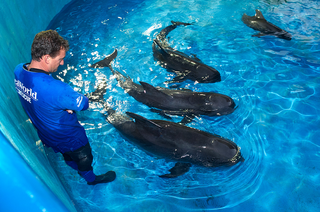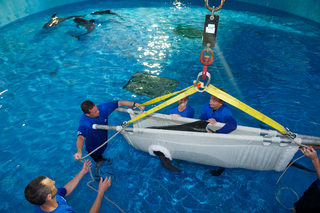Four Baby Whales Rescued in Florida

Four rescued baby pilot whales have been taken to SeaWorld Orlando after washing up on a Florida beach. The whales, one male and three females, are the only survivors of a mass stranding that left 18 other whales dead.
On Saturday (Sept. 1), a pod of 22 short-finned pilot whales turned up at Avalon State Park Beach near St. Lucie on Florida's east coast. Volunteers and environmental officials responded to the scene to try to keep the whales — the largest of which was more than 25 feet (7.6 meters) long — hydrated and shaded.
But 17 died or had to be euthanized. The remaining five, all young whales, were brought to a rehab center at Florida Atlantic University's (FAU) Harbor Branch Oceanographic Institute. There, they were treated for malnutrition, dehydration, stress and infection, FAU officials said.

One of the whales died Monday around noon after a rapid decline in health, according to FAU; a necropsy, or animal autopsy, was performed Tuesday. The other four were taken to SeaWorld Orlando early Wednesday and placed in a quarantine area, where they will be cared for and tube-fed, a statement from the marine park explained. The caretakers hope to return the whales to the wild eventually, but a statement from FAU said the outlook for their survival "remains guarded."
Authorities are investigating the cause of the stranding and expect to get the dead whales' autopsy results in the next several weeks. Some officials speculate that one of the dominant adult whales became ill, stranded itself and the rest of the pod followed. Pilot whales live in pods of between 15 to 50 individuals and they tend to stick together — and that means even when one of the whales becomes ill or injured.
For instance, in May 2011, more than 16 pilot whales stranded in the lower Florida Keys. "They tend to strand in pods, they stick together, if one is sick, the whole pod is going to strand," Anne Biddle, media relations director for the Marine Mammal Institute, told LiveScience at the time. And in 2003, some 25 pilot whales were stranded in the Keys.
Scientists say many factors could cause a mass stranding of whales, including disease, loud noises (from oil and gas exploration, Navy sonar, and even natural events like earthquakes), toxins or simple confusion.
Sign up for the Live Science daily newsletter now
Get the world’s most fascinating discoveries delivered straight to your inbox.
Follow LiveScience on Twitter @livescience. We're also on Facebook & Google+.

